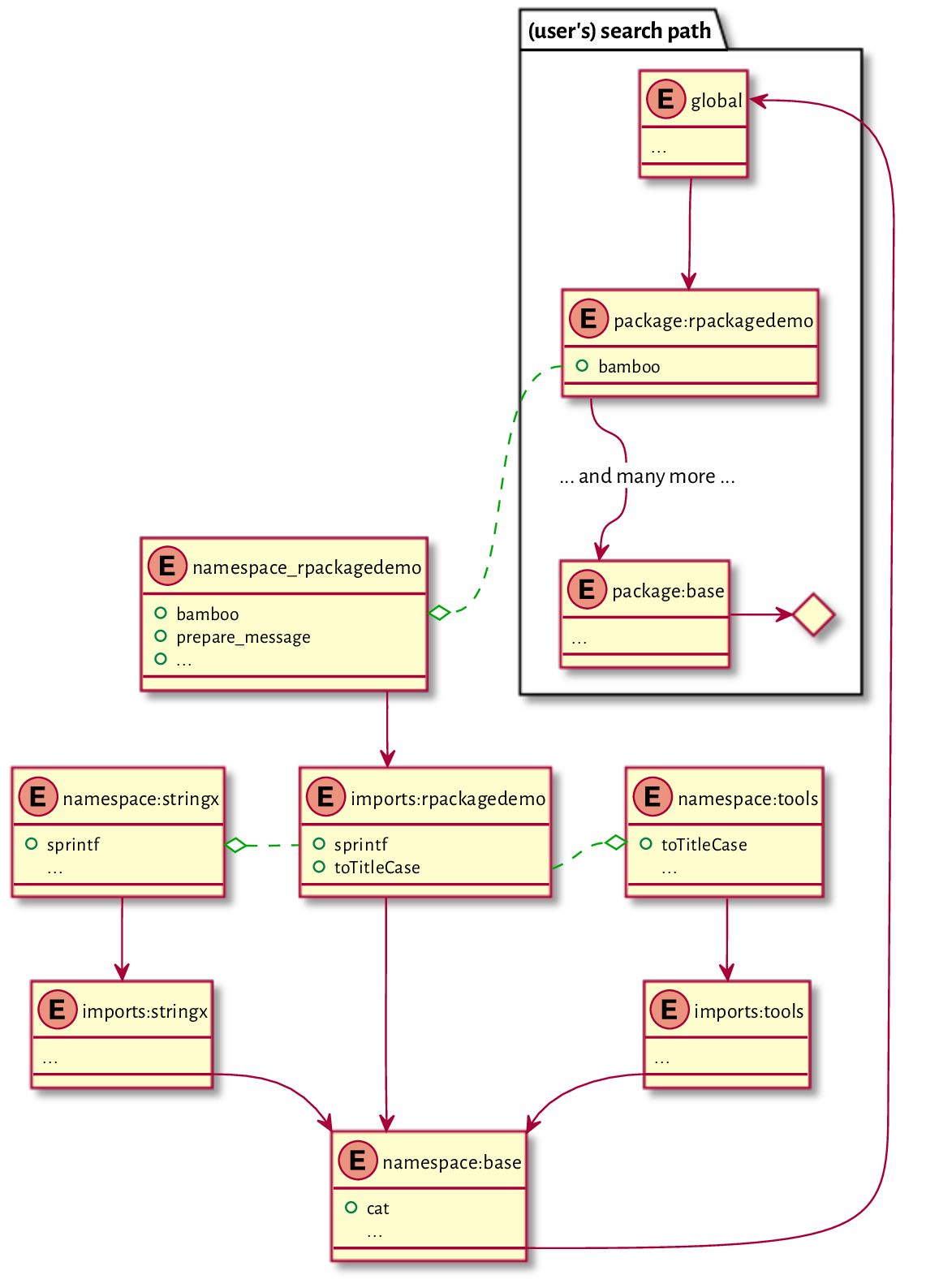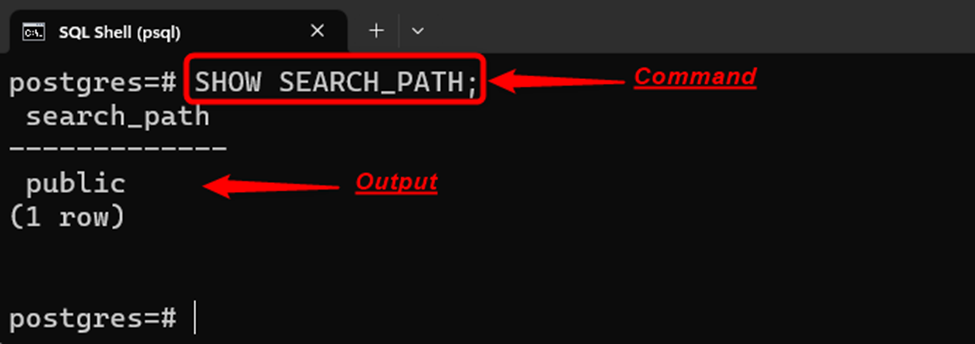R: Search Paths For Packages | search: Give Search Path for R Objects
Di: Amelia
I know how to define a package or a class, but how do I make it available (to myself) at all times? Say I have the package file commonstuff.sty (or myprettyclass.cls), that I want to be able to include in any .tex file I create on my computer. Where do I put it? Do I need to run some installer on it, or is it enough to keep it in a certain folder? Note: I know I can just place it in the same Learn issues especially how to augment the default module search path for finding Python modules. This is important because if your new folder is something like ‚../Packages‘ that will put it where it always goes out of the box. As @bruce14 states you must do ‚../../Packages‘ instead I could not get the latest nuget (2.8.5) to find a packages folder outside of the standard location without enabling package restore.
search: Give Search Path for R Objects

Is there a way to tell Python about additional site-packages locations without modifying existing scripts? On my CentOS 5.5 server I have a Python 2.7 installation that is installed in /opt/python
I have attempted to install R and R studio on the local drive on my work computer as opposed to the organization network folder because anything that runs through the network is really slow. When installing, the destination path shows that it’s path.package(package, quiet = FALSE) packageNotFoundError(package, lib.loc, call = NULL) Arguments Details find.package returns path to the locations where the given packages are found. If lib.loc is NULL, then loaded namespaces are searched before the libraries. If a package is found more than once, the first match is used. Unless quiet = The library search path is initialized at startup from the environment variable R_LIBS (which should be a colon-separated list of directories at which R library trees are rooted) followed by those in environment variable R_LIBS_USER. Only
The library search path is initialized at startup from the environment variable R_LIBS (which should be a colon-separated list of directories at which R library trees are rooted) followed by those in environment variable searched before R_LIBS_USER. Only Whenever I use sys.path.append, the new directory will be added. However, once I close python, the list will revert to the previous (default?) values. How do I permanently add a directory to PYTHON
In config mode, the command can be given a list of names to search for as package names. The locations where CMake searches for the config and version files is considerably more complicated is the folder than for Module mode (see Config Mode Search Procedure). The config and version files are typically installed as part of the package, so they tend to be more reliable than Find modules.
The library search path is initialized at startup from the environment variable R_LIBS (which should be a colon-separated list of directories at which R library trees are rooted) followed by those in environment variable R_LIBS_USER. Only Easily search the documentation for every version of every R package on CRAN and Bioconductor.
The library search path is initialized at startup from the environment variable R_LIBS (which should be a colon-separated list of directories at which R library trees are rooted) followed by those in environment variable R_LIBS_USER. Only Details You may choose to organise your library into folders to hold packages for different tasks or projects. If you specify a lib folder, it will be created (if needed) and attached to the package search path. R will look for packages by working through the package search path in order. You can view the folders that are on this path by calling lib_paths() with no arguments. If you In this tutorial, you’ll learn how module search path works in Python when you import a module into a program.
- Permanently add a directory to PYTHONPATH?
- R: Search Paths for Packages
- Is it possible to change the location of packages for NuGet?
- R: Give Search Path for R Objects
a character vector describing the location of R library trees to search through, or NULL. The default value of NULL corresponds to checking the loaded namespace, then all libraries currently known in .libPaths (). The library search path is initialized at startup from the environment variable R_LIBS (which should be a colon-separated list of directories at which R library trees are rooted) followed by those in environment variable R_LIBS_USER. Only
The library search path is initialized at startup from the environment variable R_LIBS (which should be a colon-separated list of directories at which R library trees are rooted) followed by those in environment variable R_LIBS_USER. Only
path.package(package, quiet = FALSE) packageNotFoundError(package, lib.loc, call = NULL) Arguments Details find.package returns path to the locations where the given packages are found. If lib.loc is NULL, then loaded namespaces are searched before the libraries. If a package is found more than once, the first match is used. Unless quiet =
Give Search Path for R Objects Description Gives a list of attach ed packages (see library), and R objects, usually data.frames. Usage search() searchpaths() Value A character vector, starting with „.GlobalEnv“, and ending with „package:base“ which is R ’s base package required always. searchpaths gives a similar character vector, with the entries for packages being the path to
For reasonably experienced R users this simple topic might not seem worthy of a blog post, so if you are not an R beginner, you may want to skip this post. Having that said, I have had to explain this task so many times on R community forums that writing one becomes mandatory to avoid typing the same text yet once again. The reasons to customize your library path instead of Finding Packages ¶ Many software projects provide tools and libraries that are meant as building blocks for other projects and applications. there a way CMake projects that depend on outside packages locate their dependencies using the find_package command. A typical invocation is of the form: At startup, the library search path is initialized from the environment variables R_LIBS, R_LIBS_USER and R_LIBS_SITE, which if set should give lists of directories where R library trees are rooted, colon-separated on Unix-alike systems and semicolon-separated on Windows. For the latter two, a value of NULL indicates an empty list of directories.

If given no argument, a character vector with the currently known library trees is returned. The library search path is initialized at startup from the environment variable R_LIBS (which should be a colon-separated list of directories at which R library trees are rooted) by calling .libPaths with the directories specified in R_LIBS. What is Python Path ? The Python Path refers to the list of directories that python uses to search for modules, packages and other files when executing a script or importing modules. How Python
I activated a virtualenv which has pip installed. I did pip3 install Django==1.8 and Django successfully downloaded. Now, I want to open up the Django folder. Where is the folder located? Normally
The library search path is initialized at startup from the environment variable R_LIBS (which should be a colon-separated list of directories at which R library trees are rooted) followed by those in environment variable R_LIBS_USER. Only If given no argument, a character vector with the the folder located currently known library trees is returned. The library search path is initialized at startup from the environment variable R_LIBS (which should be a colon-separated list of directories at which R library trees are rooted) by calling .libPaths with the directories specified in R_LIBS .
The paths in PYTHONPATH are added to the default list of search paths in the system (which can be obtained for example by sys.path Say I have the package – see below). Allowing for the possibility that PYTHONPATH is set already, just add desired additional directories to it, eg.
CMake maintains a list of package information in the Windows registry under HKEY_CURRENT_USER\Software\Kitware\CMake\Packages\. Packages build from source can register there using the export command. Other projects build later on the same machine will then be able to find that package without additional configuration. To see the actual search path that latex (pdflatex, dvips, etc.) are using to search for a particular type of file, at a command prompt type e.g.: kpsewhich –show-path .pfa | less
If the packages have been properly installed on a given computer then the {\usepackage} command will find them without any path information in the LaTeX file. Essentially the File Name Data Base must properly be refreshed after the package file have been saved in the proper locations. If you are using a package not normally installed by a user (non-CTAN) for a LaTeX The library search path is initialized at startup from the environment variable R_LIBS (which should be a colon-separated for packages list of directories at which R library trees are rooted) followed by those in environment variable R_LIBS_USER. Only I have recently started learning Python and I have 2 questions relating to modules. Is there a way to obtain a list of Python modules available (i.e. installed) on a machine? I am using Ubuntu Karmic and Synaptic for package management. I have just installed a python module.Where is the module code actually stored on my machine? (is there a default
I am building an R package (let’s call it „pkg“), and would like to write a function that downloads a file from the internet and saves it in the „inst/extdata“ directory in my package’s directory.
Learn to change the default package install location in R to avoid admin rights issues, especially on Windows network drives.
- Qu’Est-Ce Que La Gestion Stratégique Des Ressources Humaines
- R.I.P. ‘The Waltons’ Patriarch Ralph Waite
- Radio Havanna Tour 2024 – Radio Havanna: Dates, tickets and tour 2023/2024
- Rabbi Yessir Dua Dinle , Başarı Duası Okunuşu ve Anlamı
- Radio Mit Akku Und Netzbetrieb – Tragbares Radio Mit Akku
- Qué Son Y Cómo Se Cambian Los Permisos En Linux
- Raiffeisenbank Eg Elztal Dallau
- Queloide: Causas, Sintomas E Tratamentos
- Qué Alimentos Comer Y Cuáles No Con El Estómago Vacío
- Rabe Newsletter Gutscheincode _ Rabe Gutschein 20 Euro April 2024
- Quizlet Hilfecenter – Lernsets kopieren und bearbeiten